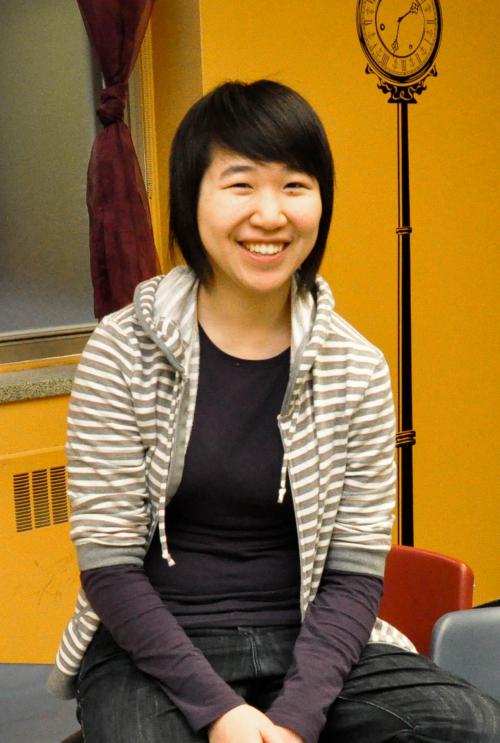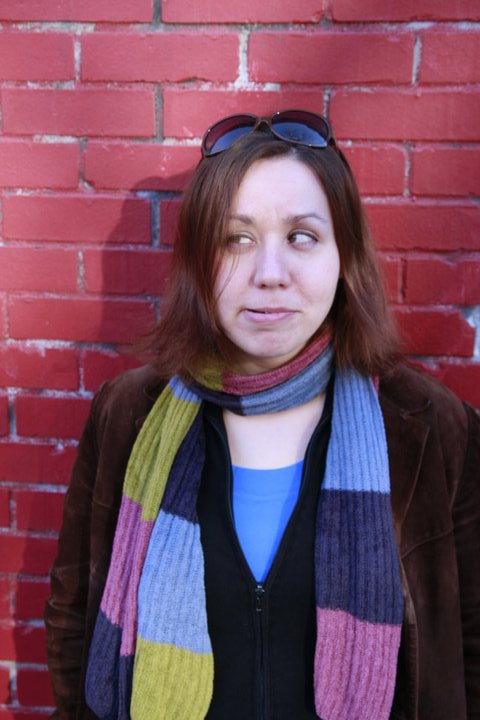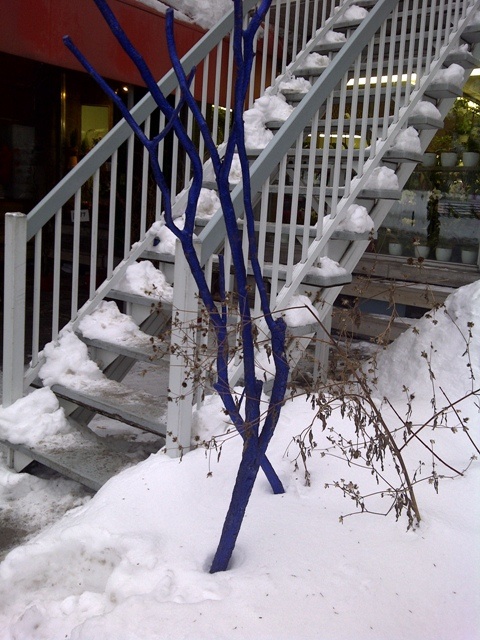Hello and welcome to your backstage pass to what’s going on at C’est La Vie Theatre, the CLV Community Corner. In this space we’ll be having interviews with the writers and actors of this season’s plays, competitions, local play happenings, and your own submissions to us. So stay tuned for bonus material.
This is a space for completely open discussion and it will be your best resource to find out what’s new with CLV. We are looking forward to engaging conversations with CLV collaborators and audiences. We encourage you to comment on all of our posts – don’t be shy now!
We look forward to some great times ahead with the community and without further ado let’s start off this new season with our first of many interviews!
 We sat down with Natalie, the author of Jump (which we will be airing next week) and talked to her about herself and her inspirations.
We sat down with Natalie, the author of Jump (which we will be airing next week) and talked to her about herself and her inspirations.
Where do you live?
I currently live in New York City. However, when I wrote Jump, I lived in Montreal. Ironically, when I lived in Montreal Jump was produced in New York, and now that I live in New York, it is being produced in Montreal. These two cities are always tugging at my heart.
Where are you from? Hometown?
I am from Toronto (or more specifically, Richmond Hill, which is north of Toronto).
When did you start writing?
Rummaging through old boxes while moving, I found old journals and stories that I wrote when I was as young as 8. I convinced my 8-year-old self that I wanted to write a children’s book, and found the first three chapters in a notebook, stowed away in an old hat box. I think it’s safe to say I’ve been writing for as long as I could hold a pencil.
Why did you start writing?
I have always loved to write. Journal writing is incredibly important to me, both as a documentation of my life and as a way to get my thoughts down on the page. I feel like once they are down on paper, I can stop holding on to them in my brain.
What inspires you?
Writing, as an act, inspires me. It has always played a therapeutic role in my life, and has provided a creative outlet for my thoughts. I hold many idyllic memories in my mind and heart of dimly-lit cafes, balconies overlooking the ocean or my room at twilight, where I can see myself scribbling away in a notebook that calls to me for some reason or other. Writing in cursive inspires me (however, I always type my plays out on a computer, despite my strict rule to journal write with a notebook and a pen). I am inspired by human interaction and interpersonal relationships. I tend to write dialogue-centered work, rather than plot driven writing. My family inspires me. Similarly, cultural backgrounds are interesting to me, and I have come to accept my Russian heritage more and more as I grow older. I realized this after reading Chekhov in undergrad. I had a different reading of his plays than most of my non-Russian peers, and it hit me in that moment that you can’t escape your upbringing.
What inspired this play?
My grandfather inspired the conception of Jump. It developed out of an experiment to base characters off of real people that I can know and understand, as well as imagine, and see how they do pinned up against one another. These two characters developed symbiotically, as I tried to create a situation where each would be forced to interact and change because of the other.
How long did it take you to write this play?
The heavy lifting really happened in one night. I had the inspiration, and stayed up all night writing. My computer tells me I created the documented on April 23, 2011 at 12:41am and worked the first draft until 5:24am. Following that night, I sent the play to a select number of friends who I trusted to give me honest feedback. I remember I didn’t come back to the play right away. The editing period took a couple of months before I finally sent it off to be considered by theatre companies.
What do you write other than plays?
Essays. I used to write poems and songs when I was younger. I dabbled with short stories for a time, but the moment I discovered playwriting, that was it. No other medium could complete… Except essays, of course… when you’re a student, nothing can compete with essay writing.
On a more personal level, I am a huge journal writer, and I love to write letters.
What time of day do you write best?
My creative writing brain turns on from around 12am-5am in the morning. I’m a night owl.
Where do you write? (coffee shops, home etc.?)
While I have heard that working in bed is “not good for you” (supposedly it disrupts your sleeping place by confusing it with your working place), this is not the case for me. My bed is my sanctuary. I am most creative as I am just about to fall asleep, and tend to stay up late hours when I feel inspired to write. I own a desk, but I use it as a placeholder for the millions of papers and notes I find lying around my apartment. To date, I’ve never sat at it. The first stages of Jump occurred in one all-nighter in Montreal. Subsequently, many cafés were visited during the editing stages. I am a fan of a nice Mocha with a chocolate chip scone.
What do you like best about writing for theatre compared to other mediums?
My affinity for dialogue is what draws me to playwriting. Moreover, the possibility that these words could be brought to life is exciting! The first time I heard one of my plays on stage, I was floored. I learned a valuable lesson from that experience that continues to influence my work to this day. I learned that my personality, beliefs and ideas were hidden behind my words. Since then, I’ve worked on shaping my writing. On the one hand, I try to maintain the parts of my work that make them unique to me, but on the other, I have tried to expand my mind to be able to write outside of my own character, to be able to truthfully portray other people.
What is the greatest challenge you think writers face today?
For me, my daytime life gets in the way of my nightly writing-life. However, as someone who enjoys writing as a hobby, I am willing to sacrifice sleep on a particularly inspired night to write. I can’t imagine how hard it must be for a writer who wishes to turn his or her writing-life into his or her whole life. It takes daily practice, like working out a muscle, to develop writing skills – not to mention enough diligence and discipline to keep at it. I would have to say that financial stressors are probably the greatest, if not one of the greatest, challenges that writers face: striving to balance a day job with an art that takes daily work and toil.
What kind of support do you have for your writing? Writing centres, groups etc.
My friends provide me with the greatest support system. I am blessed to have a few wonderfully creative and trustworthy friends who I share my writing with. It takes years to develop a relationship where there can be real trust and honesty. It takes even longer to learn the language of the person who you are trusting with your work and vice versa. Everyone has a unique way of expressing themselves. Everyone speaks their own language. It is the responsibility of both the writer and the editor to allow the writer’s language to stay their own, while still working towards improving the work.
Do you have a day-job? What do you do other than writing?
Currently, my “day-job” is being a Graduate Student at Columbia University. I’m working towards my MFA in Theatre Management and Producing. The program allows me to experience the theatre industry in New York by working in both the commercial and not-for-profit sectors on Broadway, Off-Broadway and beyond. I am also Co-Founder and Producer of a theatre company in Montreal called Beautiful City Theatre. BCT is about to open with its inaugural production, Godspell, at Centaur Theatre on January 24, 2013, running from Jan 24-26 and Jan 31-Feb 2nd.
Are you on FB, Twitter, Flicker? Do you have a website/blog? Can I contact you?
Beautiful City Theatre’s FB page: www.facebook.com/beautifulcitytheatre
(FR) Théâtre Belle Cité FB account: www.facebook.com/theatre.cite
Beautiful City Theatre’s Twitter: @B_CityTheatre
Beautiful City Theatre’s Website: www.beautifulcitytheatre.com
Contact Email: n.gershtein@beautifulcitytheatre.com
 Where do you live?
Where do you live?








